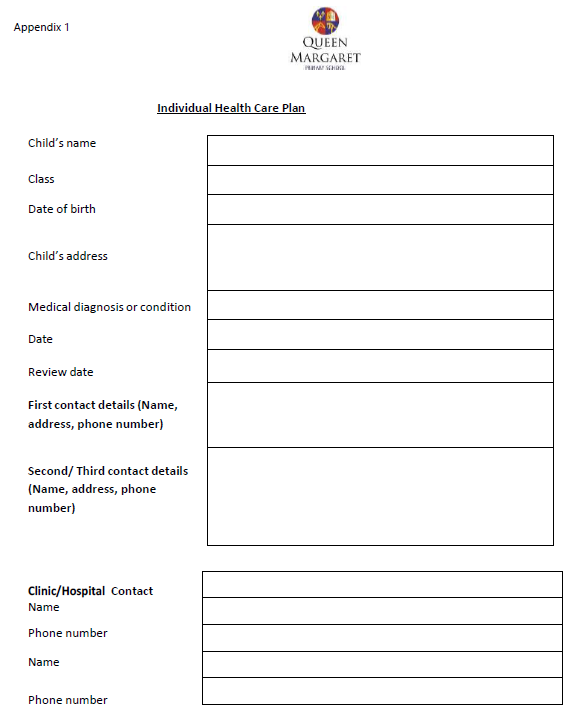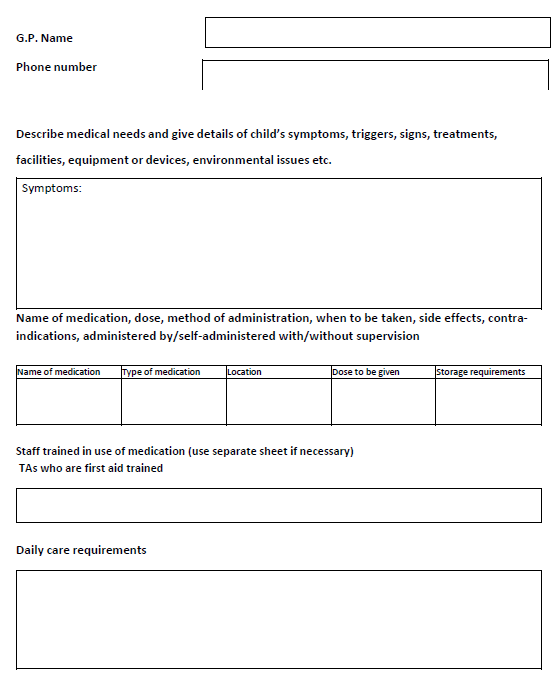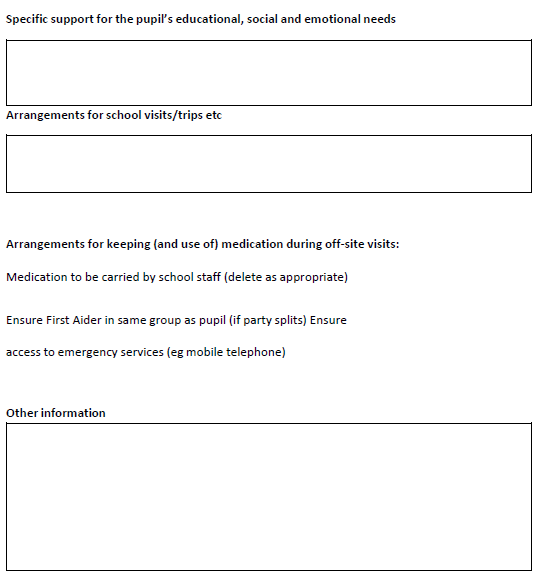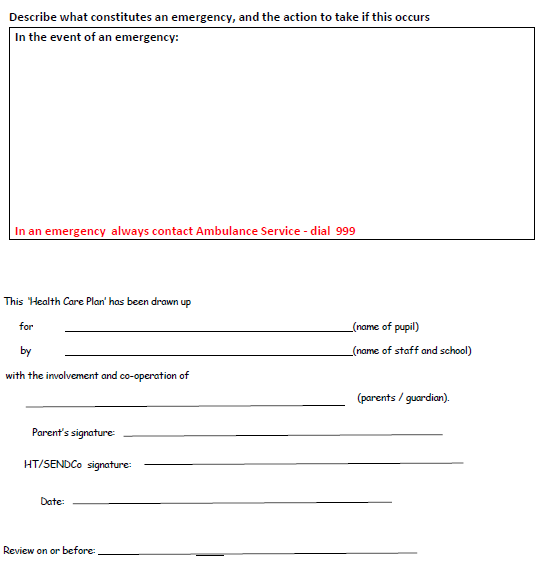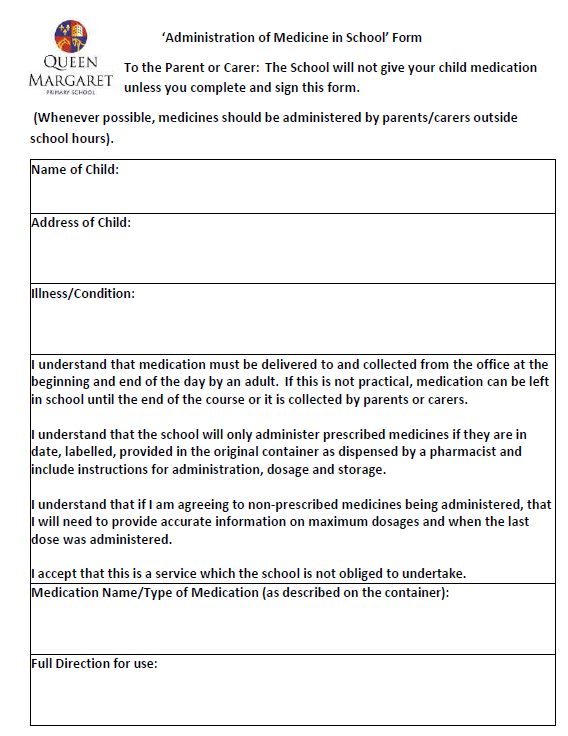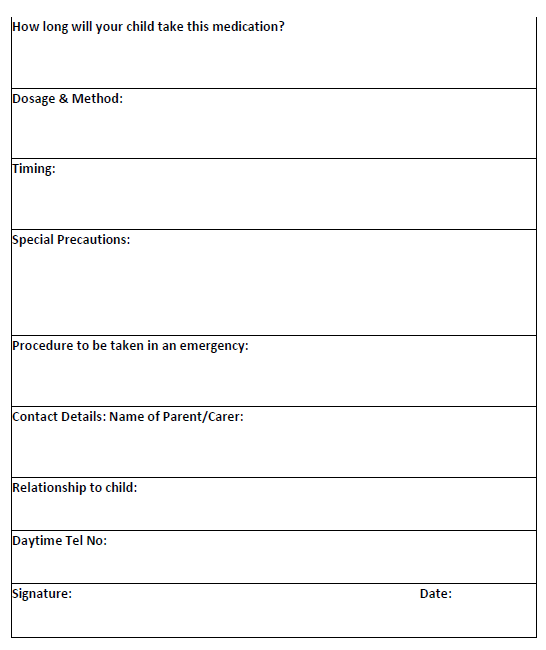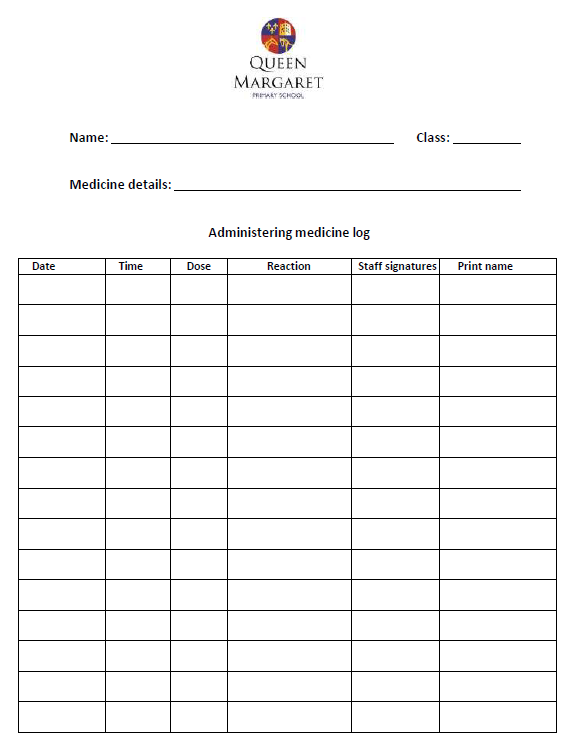Queen Margaret Primary School wishes to ensure that pupils with medical conditions receive appropriate care and support at school. This policy has been developed in line with the Department for Education’s guidance released in Dec 2015 – “Supporting pupils at school with medical conditions”.
Pupils with special medical needs have the same rights of admission to the school as other children and cannot be refused admission or excluded from school on medical grounds.
Pupils’ medical needs may be broadly summarised as being of three types:
(a) Short-term affecting their participation in school activities whilst they are on a course of medication.
(b) Long-term potentially limiting their access to education and requiring extra care and support (deemed special medical needs).
Most children will at some time have short-term medical needs, perhaps entailing finishing a course of medicine such as antibiotics.
(c) Pupils who may very rarely require medication to be given in an Emergency. Where the pupil has not previously been known to have a medical condition and the medical emergency arises “out of the blue”.
Key Points from DfE Guidance – Supporting Pupils at School with Medical Conditions – December 2015:
At Queen Margaret Primary School, we ensure that pupils at school with medical conditions, are properly supported so that they have full access to education. This includes school trips and physical education so that these children play a full and active role in school life, remain healthy and achieve their academic potential. The
Governors support the school in achieving this and as a Governing Body, ensure that appropriate staff consult health and social care professionals, pupils and parents, to ensure that the needs of children with medical conditions are properly understood and effectively supported.
The Headteacher and SENDCo , have overall responsibility to ensure that procedures are in place and followed whenever the school is notified that a pupil has a medical condition (see procedures below). The Class Teacher has responsibility for writing the IHCP.
The Headteacher or SENDCo may delegate responsibility for Individual Health Care Plans and/or Medical Alerts, and their development and use in supporting pupils at school with medical conditions. Individual Health Care Plans and/or Medical Alerts, are reviewed at least annually or earlier if evidence is presented that the child’s needs have changed. They are developed with the child’s best interests in mind and assess and manage risks to
the child’s education, health and social well-being and minimises disruption.
The main purpose of an IHCP (Appendix 1) is to identify the level of support that is needed at school for an individual child. The IHCP clarifies for staff, parents/carers and the child the help the school can provide and receive.
An IHCP will:
The class teacher may also create a Medical Alert if needed for a child. (Appendix 2) This would be required if the child has a Healthcare need that all staff should be aware of and ‘alerted’ to.
At Queen Margaret Primary School, we try to support and encourage children, who are able, to take responsibility to manage their own medicines from a relatively early age. Children with a long-term illness should, whenever possible, assume complete responsibility under the supervision of their parent. There may be circumstances where it is not appropriate for a child of any age to self-manage. Health professionals need to assess, with parents and children, the appropriate time to make this transition and advise the school accordingly.
Pupils are not allowed to carry any non-prescription drugs in school; this is to ensure that no pupil unwittingly or otherwise gives another pupil his or her medication. Medicines should only be administered at school when it would be detrimental to a child’s health or school attendance not to do so. Prescription medicines must be in date, labelled, in the original container including prescriber’s instructions re administration, dosage and storage.
Parents should be encouraged to look at dose frequencies and timing so that if possible medicines can be taken out of school hours. Parents can ask doctors for timed-release medication for a minimum number of daily doses.
Staff should not force a child to take their medicine or carry out a necessary procedure if the child refuses. Instead, they should follow the procedure agreed in the individual healthcare plan and inform the child’s parents.
No child under 16 should be given prescription or non-prescription medicines without their parents written consent (in exceptional circumstances where the medicine has been prescribed to the child without the knowledge of the parent, every effort should be made to encourage the child to involve their parents while respecting their right to confidentiality.)
Unless there is written confirmation from a GP that this has been agreed, non-prescription drugs will not be administered on a regular basis.
Storage, administration and handling of Medicines: For safety reasons, most medicines are stored safely in the Staff Room. The exception to this is inhalers which are stored in the classrooms so they are easily accessible to the children as required. Children should know where their medicines are at all times and be able to access them immediately. Where relevant, they should know who holds the key to the storage facility. Parents are asked to deliver any medication to school via the office so that medication can be stored safely. Only medicines that have parental authorisation and are appropriately named are allowed in school. When no longer required, medicines should be returned to the parent to arrange for safe disposal. Sharps boxes should always be used for the disposal of needles and other sharps.
It is the responsibility of trained First Aid staff in school, to ensure that the first aid stocks are checked and replenished regularly and that all first aid equipment is maintained. Where deficiencies are identified, they must ensure new stock is ordered by placing an order with the school administrators. For further information, please see our First Aid Policy.
The administration of antibiotics in school, will be permitted only if the recommended dosage is four or more times per day. A prescribed dosage of 3 times per day is usually taken at home before school, after school and at bedtime.
EpiPens are stored in clear plastic boxes with the picture of the child on the outside and the care plan enclosed. Children are required to have 2 Epipens in school; one in class and one in the School office.
Parents/Carers have the responsibility of checking whether the medication is in date; however the SBM /First Aid lead will also check this annually when the children change class.
A register of pupils who have been prescribed an Epipen is kept in the School Office.
Children with asthma should have easy access to their inhaler, which must be clearly marked with their name. Inhalers for children should be kept in a clearly marked box in the classroom. Medicine should not be locked away.
The only inhaler a child should have at school is their blue inhaler, which is the relief inhaler. Other inhalers are preventative and should be taken in the morning and the afternoon at home.
The prime responsibility for a child’s health, lies with the parent/carer who is responsible for the child’s medication and must supply the school with all relevant information needed in order for proficient care to be given to the child.
It is expected that parents will inform the school of any medical condition which affects their child, and provide evidence where requested.
Parents will supply school with appropriately prescribed medication, where the dosage information and regime is clearly printed by a pharmacy on the container and details included inside the container parents will ensure that medicines to be given in school are in date and clearly labelled parents will co-operate in training their children to self-administer medicine if this is appropriate.
After discussion with parents, children who are competent should be encouraged to take responsibility for managing their own medicines and procedures. This should be reflected within Individual Healthcare Plans.
Wherever possible, children should be allowed to carry their own medicines and relevant devices, or should be able to access their medicines for self-medication quickly and easily. Children who can take their medicines themselves, or manage procedures, still require an appropriate level of supervision. If it is not appropriate for a child to self-manage, relevant staff should help to administer medicines and manage procedures for them. If a child refuses to take medicine or carry out a necessary procedure, staff should not force them to do so, but follow the procedure agreed in the Individual Healthcare Plan. Parents should be informed so that alternative options can be considered.
Any member of school staff should know what to do and respond accordingly when they become aware that a pupil with a medical condition needs help.
If a member of staff supports a child with an IHCP that requires them to administer regular medication i.e. insulin for a diabetic child, then it is their responsibility to ensure that they follow the procedure set out in this policy.
The school nursing services are responsible for notifying the school when a child has been identified as having a medical condition which will require support in school. Wherever possible, they should do this before the child starts at the school. They would not usually have an extensive role in ensuring that schools are taking appropriate steps to support children with medical conditions, but may support staff on implementing a child’s individual healthcare plan and provide advice and liaison, for example, on training.
Other healthcare professionals, including GPs and pediatricians, should notify the school when a child has been identified as having a medical condition that will require support at school. They may provide advice on developing individual healthcare plans. Specialist local health teams may be able to provide support in schools for children with particular conditions (e.g. asthma, diabetes, epilepsy).
The Headteacher will ensure that all staff know what action to take in the event of a medical emergency. This includes:
Named members of the school staff are trained first aiders and in the event of an accident, appropriate first aid will be given.
The Governing Body is responsible for ensuring that written records are kept of all medicines administered to children.
Completed medical forms should be kept in the medical folder in the office, in the child’s classroom and a copy in the SEND files. The information from the medical form will be updated onto the child’s central information (SIMs) by the Admin Team.
IHCP’s will be stored in the class medical folder, CPOMs and on the Inclusion files. A copy of Healthcare Alerts will be displayed in the classroom, First Aid Room and in the Staff Room.
Administering medicine forms will be available from the office on request. The completed form will be kept in the Inclusion files.
When arranging a school trip, staff carry out a risk assessment that includes children with medical needs.
A copy of the IHCP is taken on the trip alongside the medication. Staff supervising should always be aware of any medical needs and relevant emergency procedures.
Children with medical needs will be encouraged to take part in residential visits. The visit leader will carry out a specific and additional risk assessment. Where children without care plans have been prescribed medication, parents should include these details in the form provided for the school residential and complete a school medical form. Medication should be in the original packaging. A named member of staff will take responsibility
for the medication, ensuring that it is stored securely during the time away, that it is administered according to the information provided by the parent and that a record is kept every time the medication is administered. (As per medicine administration during a school day).
Any restriction to PE / sports activities must be noted in the IHCP’S. PE lesson will be differentiated to allow all children to be able to participate at a level that is suitable to them. Some children may need to take precautionary measures before or during exercise, and may also need to be allowed immediate access to their medicines such as asthma inhalers. Staff (Class Teachers, Lead Teacher at sporting activity) should ensure that they are aware of relevant medical conditions and any preventative medicine that may need to be taken and the emergency procedures.
All Staff are aware of the most common serious medical conditions at this school and they understand their duty of care to pupils in the event of an emergency. In an emergency school all staff are required to act responsibly.
Staff are aware that there is no legal or contractual duty to administer medication, or supervise a pupil taking medication, unless they have been specifically contracted to do so. Staff who work with groups of pupils at this school receive training and know what to do for the pupils in their care with medical conditions.
Training is refreshed for all staff at least once a year.
Action for staff to take in an emergency, for the common serious conditions at this school, is displayed in prominent locations for all staff
Although school staff should use their discretion and judge each case on its merits with reference to the child’s Individual Healthcare Plan, it is not generally acceptable practice to:
The governing body will ensure annually, that the appropriate level of insurance is in place. This will include liability cover relating to the administration of medication but individual cover may need to be arranged for health care procedures associated with more complex conditions.
Should any parent or carer be unhappy with any aspect of their child’s care at Queen Margaret Primary School, they must discuss their concerns with the school. This will be with the child’s Class Teacher in the first instance. If this does not resolve the problem, then it should be taken to a member of the Senior Leadership Team. In the unlikely event of this not resolving the issue, the parent/carer can follow the school’s complaints procedure.
This policy will be monitored yearly and updated when necessary ensuring new legislation is incorporated. Staff will regularly receive opportunities to discuss and evaluate the management of the procedures and protocols in school.
This policy will also be made available to parents on the school website. We will ask parents for annual updates regarding medical information.
